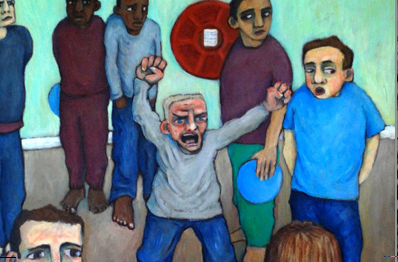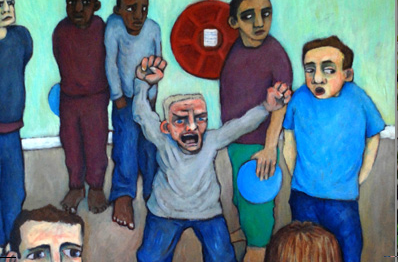[contextly_auto_sidebar]

HMP Grendon, Buckinghamshire, Ariane Bankes Outstanding Award for Oil Acrylic Painting, Koestler awards 2008
Readers of this blog often ask me about what my experience of imprisonment means to me as an ex-prisoner. This article previously appeared on Alex’s blog Prison UK (here).
Usually they are facing a prison sentence, sometimes quite long stretches, and are trying to make sense of what is about to happen to them. Or else it could be family members who are anxious over what their loved one might be going through in jail and concerned about how incarceration might change the person they know and care about.
Although it’s relatively easy to describe the basics of prison in a straightforward, factual way, it be can much more difficult to deal with the psychological and emotional impact of confinement.
A blessing in the heaviest disguise?
Prison changes everyone. Often for the worse, but sometimes the experience can also provide an opportunity for personal growth and greater self-awareness.
Prison is a voyage of discovery, a journey into the depths of the night, the longest night of the human soul, and maybe it is a wicked thing to say, but it has been a blessing in the heaviest disguise.
I rediscovered these words – written by the English novelist John King – when I was searching through some prison paperwork this morning. I had read his dystopian account of confinement, The Prison House (2004), when I was banged-up in a pretty grim Victorian-era Cat-B prison and this particular sentence really stood out.
In fact, it came to mean so much to me that I actually wrote it out on a spare prison envelope and pinned it to my cell notice board next to my bunk. This scrap of paper is one of the survivals from my time inside and I have it on my desk beside me as I’m typing this post.
Seeing time in prison as a journey appealed to me, as did the idea of using my time inside as a journey of discovery about myself, as well as others. Almost anyone can imagine being deprived of material possessions, decent food and even sympathetic human contact, but really experiencing this for months or even years is entirely another thing. You can never really be sure about the limits of your own endurance until you have explored them.
The view of imprisonment – and human suffering – as a dark night of the soul isn’t new. The 16th century Spanish friar and poet St John of the Cross explored this in his famous poem Dark Night of the Soul. John was no stranger to imprisonment, having been jailed by a faction of his fellow friars who disapproved of his reforming zeal. During the nine months he was imprisoned in the most terrible conditions he was regularly flogged – at least once a week – as well as being nearly starved to death.
Those saintly friars really knew a thing or two about dishing out Christian charity. No doubt they would be readers of the Daily Mail nowadays as they seem to have shared similar views on the best way to treat prisoners.
Eventually, John managed to break out of his cell, then climbed out of a tiny window and escaped from his torturers. He went on to become one of Spain’s most celebrated poets and religious reformers.
Emotional battery
Fortunately, my own time in the slammer didn’t involve physical flogging, but there was a degree of emotional battery, including periods spent in solitary confinement and the realisation of what losing your liberty really means in practice. No longer having any real choices. Not being able to engage directly with family members and friends at will. Obeying orders, no matter how ridiculous or unfair or humiliating they might be. Being told off like a naughty child. Witnessing acts of extreme violence. All of these can have lasting impacts, emotional as well as psychological.
Occasionally, I still get angry about things that occurred in prison, even though I’ve now been out for two years. Not all of these incidents happened to me, but often to those around me. There were acts of gratuitous cruelty, sometimes committed by members of staff, but often between prisoners themselves.
Like other closed communities, prison can offer a playground for sadists who enjoy causing pain and hurt to others, so perhaps that should come as no great surprise.
On the other hand, I have also witnessed amazing acts of kindness and selflessness. I’ve written about this phenomenon previously (read here), but it is still worth emphasising again that many prisoners demonstrate a genuine capacity for caring for those around them, especially those who are in distress or suffering from ill-health.
Recognising this was also an important part of my own journey through this unfamiliar terrain that I was exploring.
Of course, I had my own ‘dark nights’ in my cell. Everyone does. There were nights after the lights had gone out that I genuinely hoped I wouldn’t wake up the next morning. Or that if I did, this would all turn out to have been a very long and vivid nightmare.
At times, I was genuinely amazed at how resilient I actually became behind bars. Experiences that I’m sure would have left me crushed or devastated in my previous life could now be endured or even laughed off. I had never really taken Nietzsche’s famous comment ‘that which does not kill us makes us stronger’ seriously before, but it was a common expression amongst prisoners. I doubt that the old German philosopher could have imagined that one of his quotes would become the motto of many prison inmates, but it really has, even if many of those who quote it have no idea of its origins.
Blessing in disguise
I’m sure that testing your own limits is a strong driving force for many explorers and adventurers. Programmes about travelling to distant or inaccessible lands, or else rowing across vast oceans, have become part of the stable diet on television, particularly when some celebrity or other is dragged through the wilderness or the snow. Even US President Barak Obama recently got in on the act (backed up by an enormous retinue of secret service agents and other flunkies who mainly kept out of camera shot).
In some way or other, it is a fascinating experience to pass through some testing ordeal and emerge at the other end a stronger, better or wiser person – preferably all three.
Is it so far-fetched to imagine that a period of imprisonment might have a similar impact? That is an important question at the time when there is an ongoing debate about the nature and purpose of prison sentences.
So could time in prison ever be ‘a blessing in the heaviest disguise’ as John King had his narrator state in The Prison House? Well, in some cases, I think it can be, even when it has been reduced to little more than human warehousing.
I remember men who I’ve met in prison who have overcome a lifetime of literacy with the help of volunteer mentors trained by the Shannon Trust and can now read and write for the first time. I’ve spent time with them in prison libraries while they choose books to read for themselves.
Then there are those who have lived dangerous and chaotic lives on the street who have had the time to reflect on their choices, as well as starting to confront some of their inner demons. Others have actively sought mental health support or help with their dependencies. Some embrace therapy to equip them to better manage their anger and lack of self-control. Many are all too aware of the suffering they have inflicted on others, something that can be very difficult for some people to live with.
However, progress towards rehabilitation can be intense and time-consuming which is why short prison sentences are often counter-productive. Confining people with complex personal and psychological needs to tiny shared prison cells for 23 hours a day will very rarely address any of these issues. It is rather like putting a patient in hospital and then confining them to bed all day with no treatment whatsoever or, in too many cases, without even an initial diagnosis.
If a 5-minute conversation during the reception process with a member of the healthcare team is the total extent of most prisoners’ assessments, it is unsurprising that so much mental illness goes unrecognised and untreated in our prisons, while incidents of self-harm and suicide are increasing annually. The simple truth is that the necessary resources just aren’t there to cope in this era of overcrowding and understaffing.
Exploring our prison system isn’t just about confronting one’s own fears and anxieties during the voyage of discovery. It is also about seeing how others behave and how they are treated – or else how they are warehoused and neglected prior to being released back onto the streets. If we really want people to change for the better and to cut rates of reoffending, then sentencing thousands to watch the Jeremy Kyle Show all day on TVs we rent them for 50p a week really isn’t going to make any difference.
Had I never had these experiences myself, I would never have written so much about prisons and imprisonment based upon my own journey into the depths of the longest night. John King was right. For me, it really has been a blessing, even if it was in the heaviest of disguises.






